Colleen Hitchcock
 Environmental Studies Chair
Environmental Studies Chair
Professor of Ecology, Biology Department
Expertise: Participatory and Citizen Science, Ecology, Evolution and Conservation Biology.
Academic Interests: The role of participatory science in ecological inquiry and conservation biology specifically relating to studies of biodiversity, conservation, phenology, and climate change. Dr. Hitchcock works with students and the Brandeis community to document the natural world on campus and to help support positive ecological changes to our landscaping including the Brandeis Microforest established in 2024 and Project Pollinator micro-meadow planted in 2016. Read more about participatory science and our campus biodiversity assets below.
Participatory Science
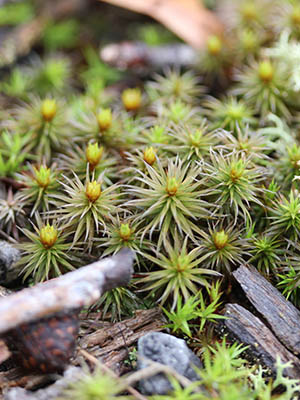 Participatory science is scientific research conducted with participation from the general public. With the rise of new social networks and crowdsourcing technologies, this field of study has grown tremendously in recent decades.
Participatory science is scientific research conducted with participation from the general public. With the rise of new social networks and crowdsourcing technologies, this field of study has grown tremendously in recent decades.
At Brandeis, we employ models of both contributory and collaborative of participatory science. This allows our university to connect students with the local community in an effort to both empower and democratize the scientific process.
Our most active citizen science project currently is the annual City Nature Challenge.
Brandeis Environmental Studies Program is a founder of the City Nature Challenge: Boston Area, where each spring we engage the public in documenting urban biodiversity on iNaturalist. Understanding how patterns of urban biodiversity are changing the urban ecological community are central research questions in our efforts to document change locally.
Biodiversity on Campus and iNaturalist
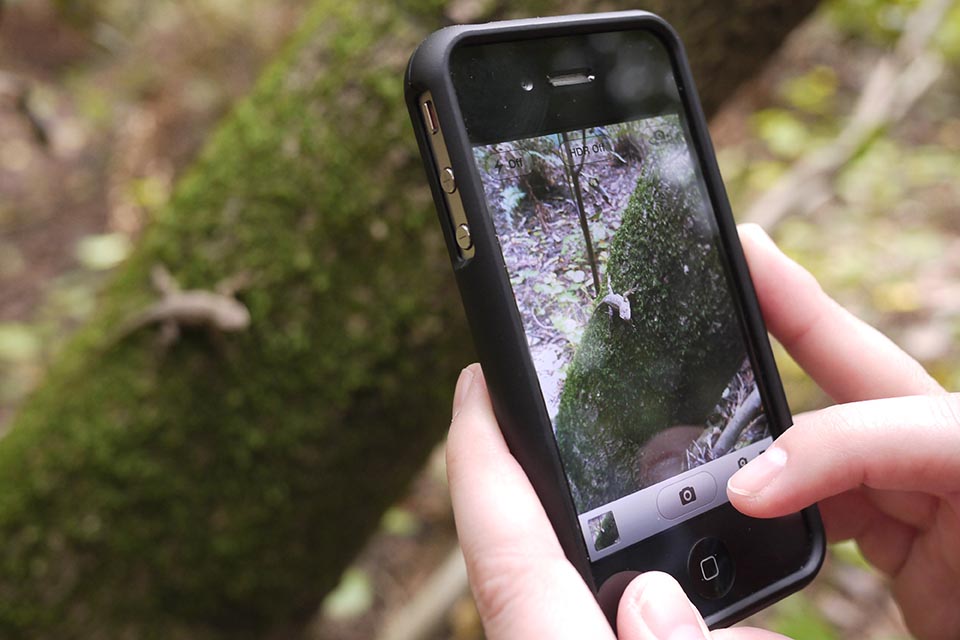 Since 2016, Brandeis campus community has been engaged in documenting biodiversity (the variety of life) on campus via the online science platform iNaturalist.
Since 2016, Brandeis campus community has been engaged in documenting biodiversity (the variety of life) on campus via the online science platform iNaturalist.Learning how to keep track of the natural world and identify species are invaluable skills for any environmental professional. iNaturalist helps us to curate what is known about our campus and the species with whom we share our 235-acre campus home.
iNaturalist is a fun, easy to use online social network that allows students to engage with a network of people who openly share their knowledge of and passion for nature. Students use iNaturalist in several courses such as Biol 17 Conservation Biology and Bisc 11a Biodiversity Connections. iNaturalist serves as a crowdsourced species-identification tool and organism-occurrence documenting tool that helps students to discover what the natural world on campus looks like and how it may change over time.
To date, Brandeis has documented more than 2,700 species and made over 50,000 observations! Take a look at the Brandeis University Biodiversity page on iNaturalist to track our progress.
One need not be a Brandeis student or enrolled in an environmental studies course to use iNaturalist. Anyone can join the iNaturalist community. Learn how to use iNaturalist through this instructional video.
Chronolog on Campus
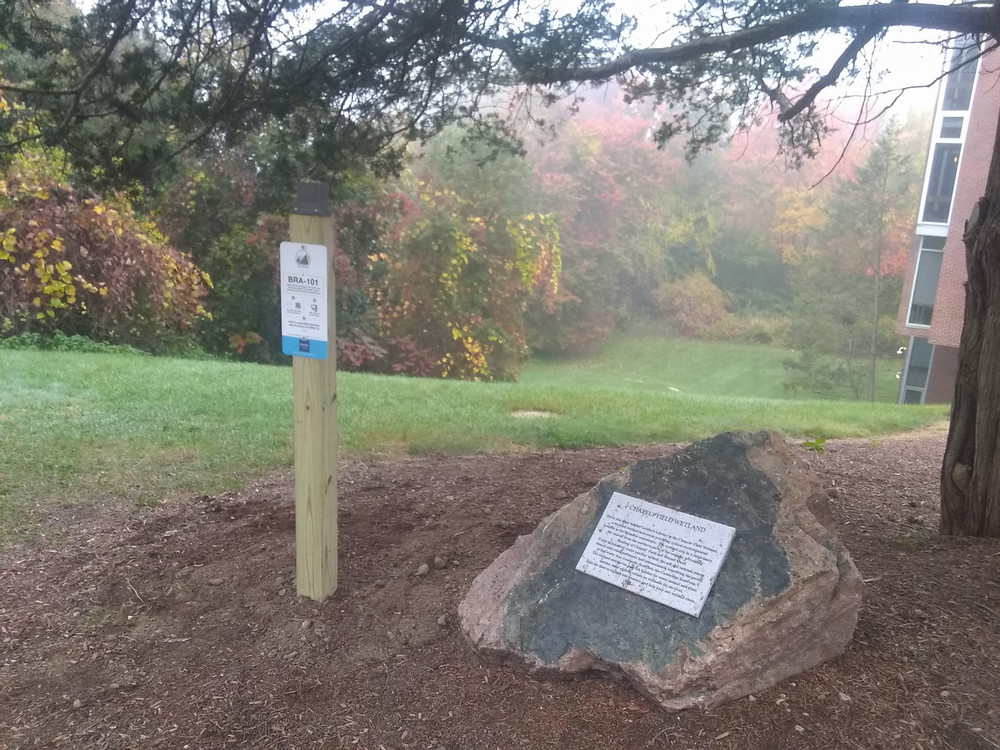 We host two chronolog stations on campus, one at Chapels Field by the library and another in Project Pollinator behind the Science Complex. Chronolog stations are ways to engage people with the natural world that inspire them to connect and think about the changes in a particular place over time. They are an opportunity to collect photographic data of places over time in a standard way. Anyone visiting campus is invited to visit one of our chronolog stations and contribute a photo to the dataset. You will then be invited to see how the locations are changing over time.
We host two chronolog stations on campus, one at Chapels Field by the library and another in Project Pollinator behind the Science Complex. Chronolog stations are ways to engage people with the natural world that inspire them to connect and think about the changes in a particular place over time. They are an opportunity to collect photographic data of places over time in a standard way. Anyone visiting campus is invited to visit one of our chronolog stations and contribute a photo to the dataset. You will then be invited to see how the locations are changing over time.
The Chapel Fields Wetland station was established in 2023 and aims to document seasonal change within the wetland. The Pollinator Project station was installed in 2021 and is documenting a few things including: the seasonal changes in the native micro-meadow which was established in 2015, seasonal change in our deciduous tree canopy, and air quality of the the Boston skyline. Stop by and add your photos today.
Campus Phenology Project
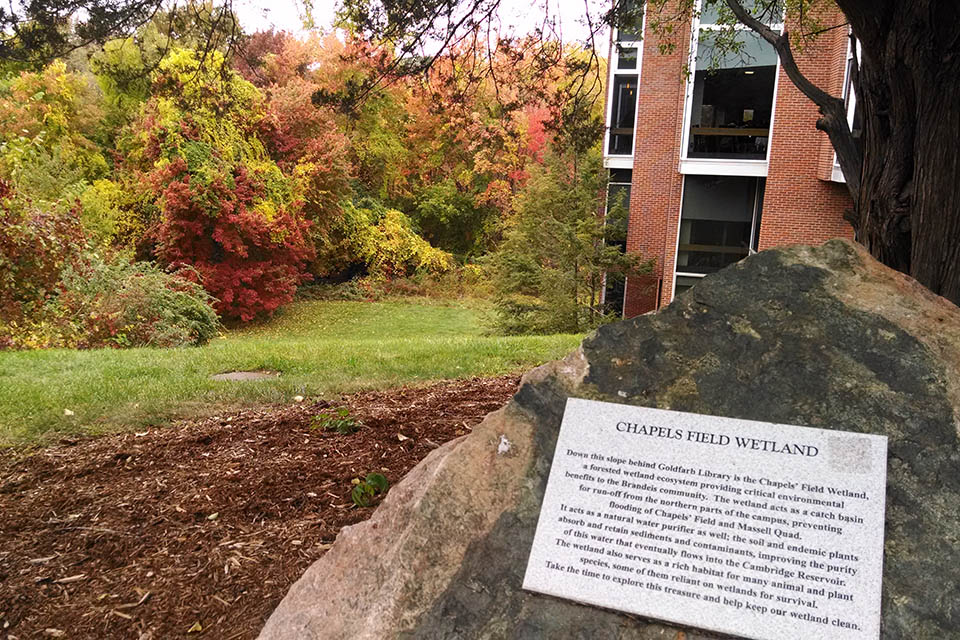 The Campus Phenology Project is a place-based project that provides opportunities for undergraduate students to conduct citizen-science research through partnership with the USA National Phenology Network.
The Campus Phenology Project is a place-based project that provides opportunities for undergraduate students to conduct citizen-science research through partnership with the USA National Phenology Network.Phenology is the study of seasonal biological events. We examine plant and animal life cycles, including leaf color change and leaf-drop of plants, emergence of insects and migration of birds. Observing and noting these seasonal events is an ordinary part of life here in the temperate Northeast.
Participating in phenology research on campus makes climate change relatable and real to students, while simultaneously building transferable skills such as analysis, synthesis and critical thinking as they place this work in the context of local research.
Our project maintains approximately 30 marked campus trees that have been monitored every year since 2015. All of the data collected on campus trees are accessible through the USANPN’s Nature’s Notebook online visualization tool.
The map of monitored campus trees is updated each fall. Each tree is embedded with a tag containing a QR code, which can be scanned to provide additional information.
Campus Biodiversity Assets - Project Pollinator
Campus Biodiversity Assets - Brandeis Microforest
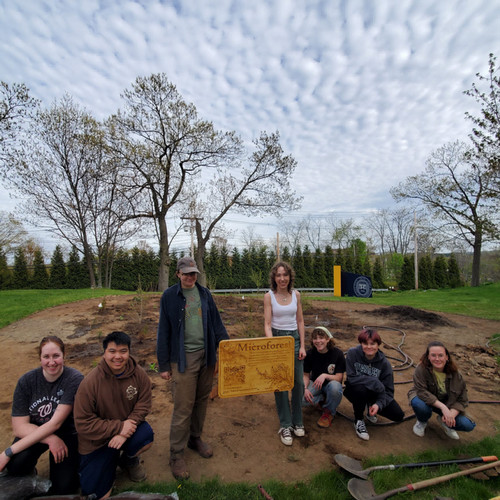 The Brandeis Microforest was planted in the spring 2024 as a course project in Prof. von Mering’s Ecofeminism and Climate Justice Activism Course. Students with the support of a Brandeis Sustainability Fund grant planted over 50 species of native trees and plants to turn a previously mowed area into native habitat. Stop by behind the Slosberg building on lower campus to watch this site grow.
The Brandeis Microforest was planted in the spring 2024 as a course project in Prof. von Mering’s Ecofeminism and Climate Justice Activism Course. Students with the support of a Brandeis Sustainability Fund grant planted over 50 species of native trees and plants to turn a previously mowed area into native habitat. Stop by behind the Slosberg building on lower campus to watch this site grow.